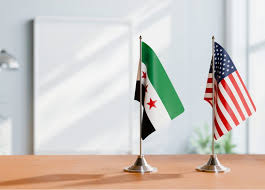"SOFAN: The American debate on sanctions policy towards Syria is escalating."

Reports from the American "SOFAN" Center for Security and Counterterrorism Studies revealed growing disagreements within the U.S. administration regarding the future of foreign policy towards Syria, especially concerning the economic sanctions imposed on it post-Assad.
Sources indicated that discussions between American policymakers and their partners are focusing on assessing the feasibility of these sanctions amidst the economic and social crises in Syria. Some officials are calling for their easing due to reasons related to regional and economic stability.
In this context, Washington's partners in the Middle East and Europe warned that the continuation of sanctions could worsen the collapse in Syria, leading to increased instability and complicating the internal scene, especially with the rise of various sectarian and ethnic armed groups like the Druze, Alawites, and Kurds seeking more autonomy. The inability of government security forces to fully control Syrian territories due to resource shortages further compounds stability challenges.
In light of these developments, European countries and U.S. allies in the region have intensified pressure on President Donald Trump's administration, cautioning that the new Syrian government could face a complete collapse if sanctions are not lifted or permanently eased. They emphasize the deteriorating humanitarian and economic situation due to these measures.
On the other hand, the Syrian banking sector faces significant difficulties in attracting investments or participating in reconstruction projects, such as electricity network development, while companies and humanitarian organizations remain hesitant to engage in Syrian activities for fear of U.S. sanctions, hindering any tangible economic improvement.
Amid ongoing discussions, some American political circles, especially those concerned with counterterrorism, seek to link any easing of sanctions to new conditions, including "Hay'at Tahrir al-Sham" proving its commitment to protecting American interests in the region. Others in Congress see the necessity of lifting or suspending sanctions for an extended period to address urgent humanitarian crises, serving Washington's strategic objectives.